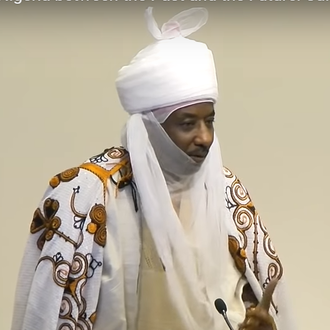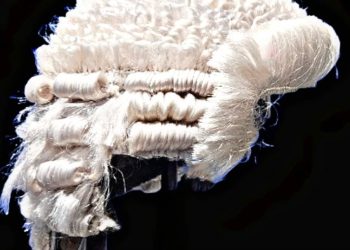Can a Federal High Court entertain a suit on a chieftaincy tussle? Matters upon which the Federal High Court can exercise jurisdiction are clearly stated in Section 251 of the Nigerian Constitution, which is herein reproduced as follows:
- (1) Notwithstanding anything to the contained in this Constitution and in addition to such other jurisdiction as may be conferred upon it by an Act of the National Assembly, the Federal High Court shall have and exercise jurisdiction to the exclusion of any other court in civil causes and matters
(a) relating to the revenue of the Government of the Federation in which the said Government or any organ thereof or a person suing or being sued on behalf of the said Government is a party;
(b) connected with or pertaining to the taxation of companies and other bodies established or carrying on business in Nigeria and all other persons subject to Federal taxation;
(c) connected with or pertaining to customs and excise duties and export duties, including any claim by or against the Nigeria Customs Service or any member or officer thereof arising from the performance of any duty imposed under any regulation relating to customs and excise duties and export duties;
(d) connected with or pertaining to banking, banks, other financial institutions, including any action between one bank and another, any action by or against the Central Bank of Nigeria arising from banking, foreign exchange, coinage, legal tender, bills of exchange, letters of credit, promissory notes and other fiscal measures: Provided that this paragraph shall not apply to any dispute between an individual customer and his bank in respect of transactions between the individual customer and the bank;
(e) arising from the operation of the Companies and Allied Matters Act or any other enactment replacing the Act or regulating the operation of companies incorporated under the Companies and Allied Matters Act;
(f) any Federal enactment relating to copyright, patent, designs, trade marks and passing-off, industrial designs and merchandise marks, business names, commercial and industrial monopolies, combines and trusts, standards of goods and commodities and industrial standards;
(g) any admiralty jurisdiction, including shipping and navigation on the River Niger or River Benue and their affluents and on such other inland waterway as may be designated by any enactment to be an international waterway, all Federal ports, (including the constitution and powers of the ports authorities for Federal ports) and carriage by sea;
(h) diplomatic, consular and trade representation;
(i) citizenship, naturalisation and aliens, deportation of persons who are not citizens of Nigeria, extradition, immigration into and emigration from Nigeria, passports and visas;
(j) bankruptcy and insolvency;
(k) aviation and safety of aircraft.
(l) arms, ammunition and explosives;
(m) drugs and poisons;
(n) mines and minerals (including oil fields, oil mining, geological surveys and natural gas);
(o) weights and measures:
(p) the administration or the management and control of the Federal Government or any of its agencies;
(q) subject to the provisions of this Constitution, the operation and interpretation of this Constitution in so far as it affects the Federal Government or any of its agencies;
(r) any action or proceeding for a declaration or injunction affecting the validity of any executive or administrative action or decision by
the Federal Government or any of its agencies; and
(s) such other jurisdiction civil or criminal and whether to the exclusion of any other court or not as may be conferred upon it by an Act of the National Assembly: Provided that nothing in the provisions of paragraphs (p), (q) and (r) of this subsection shall prevent a person from seeking redress against the Federal Government or any of its agencies in an action for damages, injunction or specific performance where the action is based on any enactment, law or equity.
(2) The Federal High Court shall have and exercise jurisdiction and powers in respect of treason, treasonable felony and allied offences.
(3) The Federal High Court shall also have and exercise jurisdiction and powers in respect of criminal causes and matters in respect of which jurisdiction is conferred by subsection (1) of this section.
The Federal High Court in Kano has removed Muhammadu Sanusi II as the 16th Emir of Kano. The court has nullified all actions taken by the Kano State government following the Kano Emirates Council (Repeal) Law 2024, which reinstated Muhammadu Sanusi II as the 16th Emir by the Kano State Government.
This ruling of the Federal High Court does not derive from the defined jurisdiction of the Federal High Court as stated above in Section 251 of the Constitution. However, the Court was of the view that the raison d’etre (reason for being) for making the order which sacked Sanusi was that the Kano State Government disobeyed its earlier order which directed it not to enforce the Kano Emirates Council (Repeal) Law 2024 by which Emir Sanusi was reinstated. Section 287 of the Constitution does empower a Court to enforce its own judgment and that of other superior courts of record in Nigeria.
Chidi Odikalu, a professor of law and rights activist, has sharply criticised the ruling of the court. In his words vide X:
Today in Kano, Abdullahi Liman, a judge of @FederalHigh, has overruled longstanding @SupremeCourtNg precedent, assumed jurisdiction he does not have to grant reliefs the parties did not ask for in exercise of powers that he lacks. Anyone who does this is a rogue not a judge. The @FederalHigh in Kano, which lacks jurisdiction over Chieftaincy matters, effectively blames the defendants for the fact that the court assumed jurisdiction it does not have in a subject matter outside its scope to issue orders that are beyond its pay grade
An appeal has been filed in the matter. Therefore, it is unlikely that the order of the Federal High Court which sacked Sanusi will be enforced.
Contributed by Frank Tietie; (07014444498); franktietie@gmail.com
















